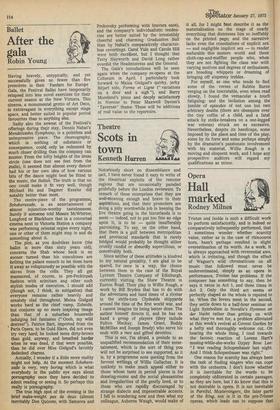Theatre
Scots in town
Kenneth Hurren Notoriously short on dissemblance and tact, I have never found it easy to write of the theatrical exploits of the remoter regions that are occasionally paraded• pridefully before the London reviewers. To remark of these enterprises that they are well-meaning enough and brave in their aspirations, and that their promoters are doing a jolly worthwhile job in keeping the live theatre going in the hinterlands is to seem — indeed, not to put too fine an edge upon it, is to be — quite insufferably patronising. To say, on the other hand, that there is a gulf between metropolitan and provincial standards that is rarely bridged would probably be thought either cruelly candid or absurdly supercilious, or conceivably both.
Since neither of these attitudes is kindred to my natural geniality, I am glad to be spared, for once in a way, the choice between them in the case of the Royal Lyceum Theatre Company of Edinburgh, currently visiting the Shaw Theatre in Euston Road. Their play is Willie Rough, a' work by Bill Bryden that has to do with the adventures and hard times of a riveter in the strife-torn Clydeside shipyards around the time of the first world war, and I cannot imagine its being better done. The author himself directs it, and he has on hand a group of players (they include Fulton Mackay, James Grant, Roddy McMillan and Joseph Brady) who serve his ends with a rare and gifted devotion.
This is not, I'm afraid, a prelude to an unqualified recommendation of their entertainment, which is the sort of thing you will not be surprised to see supported, as it is, by a programme note quoting from the fervent writings, of Willie Gallacher. It is unlikely to make much appeal either to those whose taste in period pieces is for drawing-rooms and the social pleasantries and irregularities of the gently bred, or to those who are rapidly discouraged by strange dialects and impenetrable accents. I fell to wondering now and then what my colleague, Auberon Waugh, would make of it all, for I might best describe it as the materialisation on the stage of nearly everything that distresses him so ineffably on the printed page; and the narrative lacks even the consolations of explicit sex — and negligible implicit sex — to render endurable this austere world and these cloth-cap-and-muffler people who, when they are not fighting the class war with varying motives and degrees of enthusiasm, are breeding whippets or dreaming of bringing off sixpenny trebles.
For myself, as one who tends to find some of the verses of Rabbie Burns verging on the inscrutable, even when read slowly, I found the vernacular a touch fatiguing; and the inclusion among the jumble of episodes of not one but two arbitrary deaths (there are obsequies over the tiny coffin of a child, and a fatal attack by strike-breakers on a one-legged war veteran) struck me as excessive. Nevertheless, despite its handicaps, some imposed by the place and time of the play, some by its form and some perhaps simply by the dramatist's passionate involvement with his material, Willie Rough is a moving and eloquent work, and I hope any prospective auditors will regard my qualifications as minor.


































 Previous page
Previous page